Analyzing Integrity & Objectivity: AICPA Code and Oneway Corporation
VerifiedAdded on 2023/06/13
|6
|1068
|427
Case Study
AI Summary
This case study delves into an ethical dilemma faced by Jon Williams, CPA, concerning his audit and tax client, Oneway Corporation. The scenario involves the potential sale of shares by a retiring director to another, raising questions of integrity, objectivity, and adherence to the AICPA Code of Professional Conduct. The analysis emphasizes the importance of maintaining public trust, upholding ethical standards, and ensuring independence in auditing practices. It highlights the need for CPAs to consider the broader implications of their actions and prioritize the public interest while navigating complex client relationships. The study also provides advice to William to follow the responsibilities in his work according to the AICPA code of conducts which includes following responsibilities, maintaining public interest, integrity, independence and objectivity and due care. Desklib offers a wealth of similar case studies and resources for students seeking to deepen their understanding of auditing and ethical considerations.
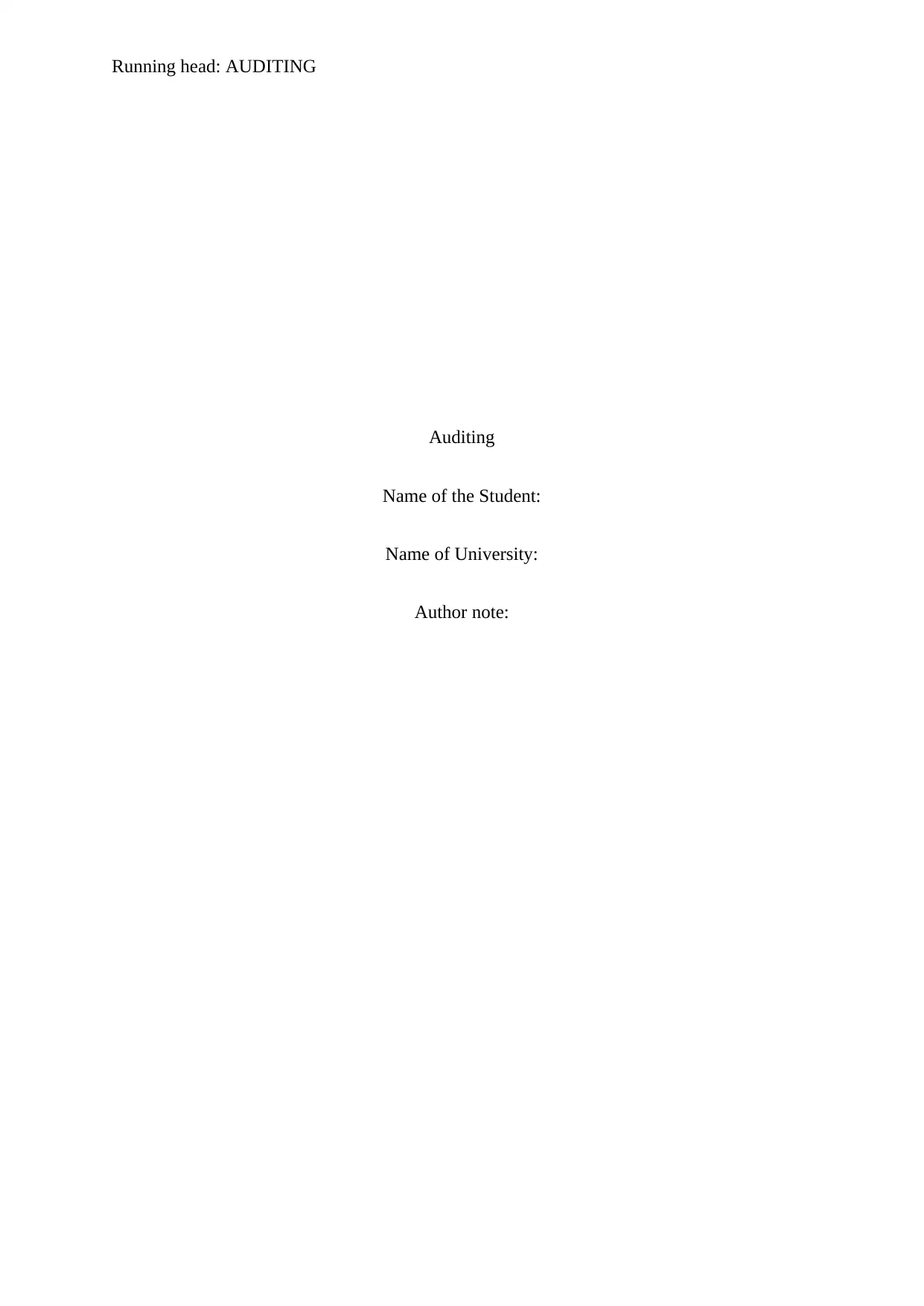
Running head: AUDITING
Auditing
Name of the Student:
Name of University:
Author note:
Auditing
Name of the Student:
Name of University:
Author note:
Paraphrase This Document
Need a fresh take? Get an instant paraphrase of this document with our AI Paraphraser
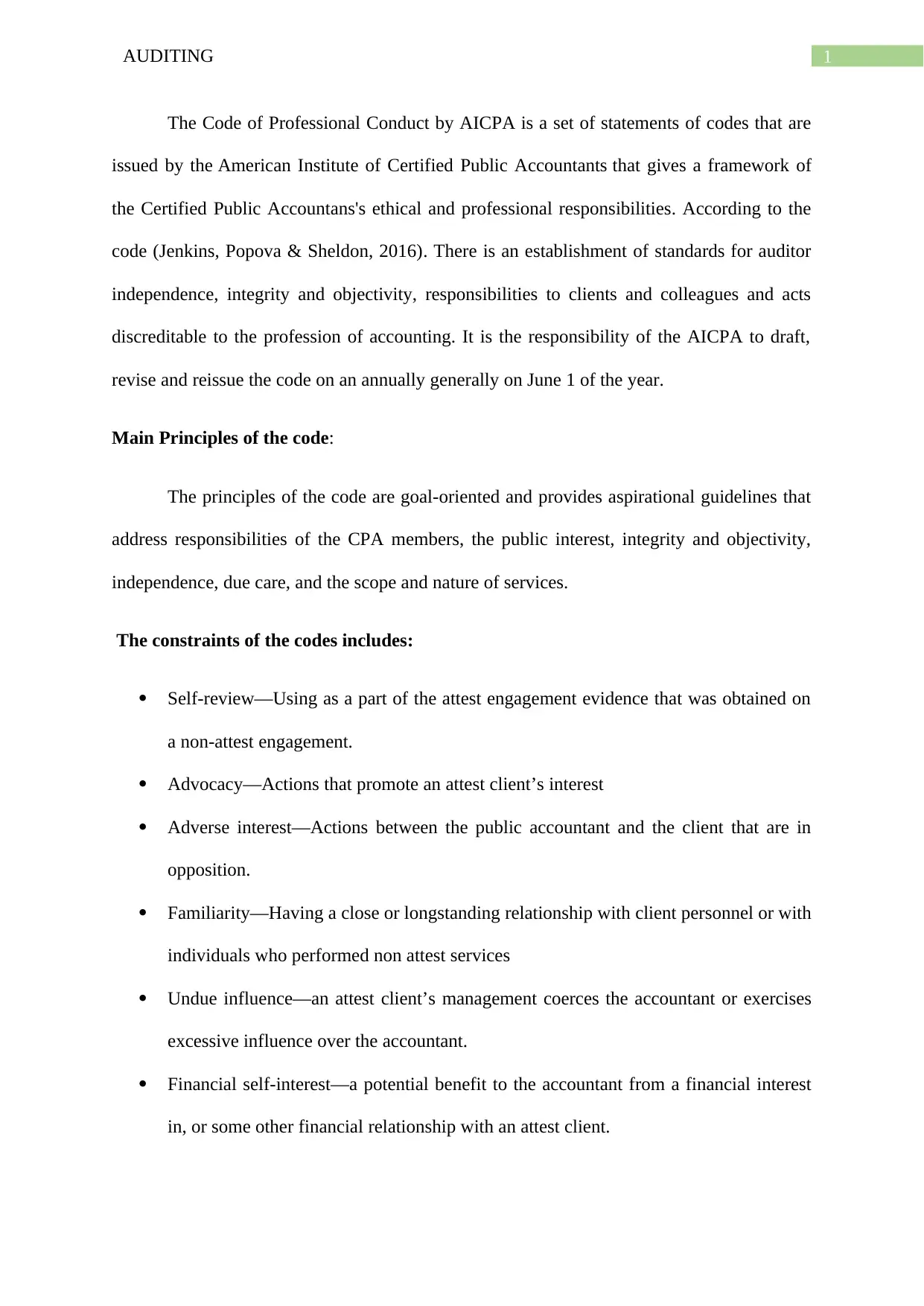
1AUDITING
The Code of Professional Conduct by AICPA is a set of statements of codes that are
issued by the American Institute of Certified Public Accountants that gives a framework of
the Certified Public Accountans's ethical and professional responsibilities. According to the
code (Jenkins, Popova & Sheldon, 2016). There is an establishment of standards for auditor
independence, integrity and objectivity, responsibilities to clients and colleagues and acts
discreditable to the profession of accounting. It is the responsibility of the AICPA to draft,
revise and reissue the code on an annually generally on June 1 of the year.
Main Principles of the code:
The principles of the code are goal-oriented and provides aspirational guidelines that
address responsibilities of the CPA members, the public interest, integrity and objectivity,
independence, due care, and the scope and nature of services.
The constraints of the codes includes:
Self-review—Using as a part of the attest engagement evidence that was obtained on
a non-attest engagement.
Advocacy—Actions that promote an attest client’s interest
Adverse interest—Actions between the public accountant and the client that are in
opposition.
Familiarity—Having a close or longstanding relationship with client personnel or with
individuals who performed non attest services
Undue influence—an attest client’s management coerces the accountant or exercises
excessive influence over the accountant.
Financial self-interest—a potential benefit to the accountant from a financial interest
in, or some other financial relationship with an attest client.
The Code of Professional Conduct by AICPA is a set of statements of codes that are
issued by the American Institute of Certified Public Accountants that gives a framework of
the Certified Public Accountans's ethical and professional responsibilities. According to the
code (Jenkins, Popova & Sheldon, 2016). There is an establishment of standards for auditor
independence, integrity and objectivity, responsibilities to clients and colleagues and acts
discreditable to the profession of accounting. It is the responsibility of the AICPA to draft,
revise and reissue the code on an annually generally on June 1 of the year.
Main Principles of the code:
The principles of the code are goal-oriented and provides aspirational guidelines that
address responsibilities of the CPA members, the public interest, integrity and objectivity,
independence, due care, and the scope and nature of services.
The constraints of the codes includes:
Self-review—Using as a part of the attest engagement evidence that was obtained on
a non-attest engagement.
Advocacy—Actions that promote an attest client’s interest
Adverse interest—Actions between the public accountant and the client that are in
opposition.
Familiarity—Having a close or longstanding relationship with client personnel or with
individuals who performed non attest services
Undue influence—an attest client’s management coerces the accountant or exercises
excessive influence over the accountant.
Financial self-interest—a potential benefit to the accountant from a financial interest
in, or some other financial relationship with an attest client.
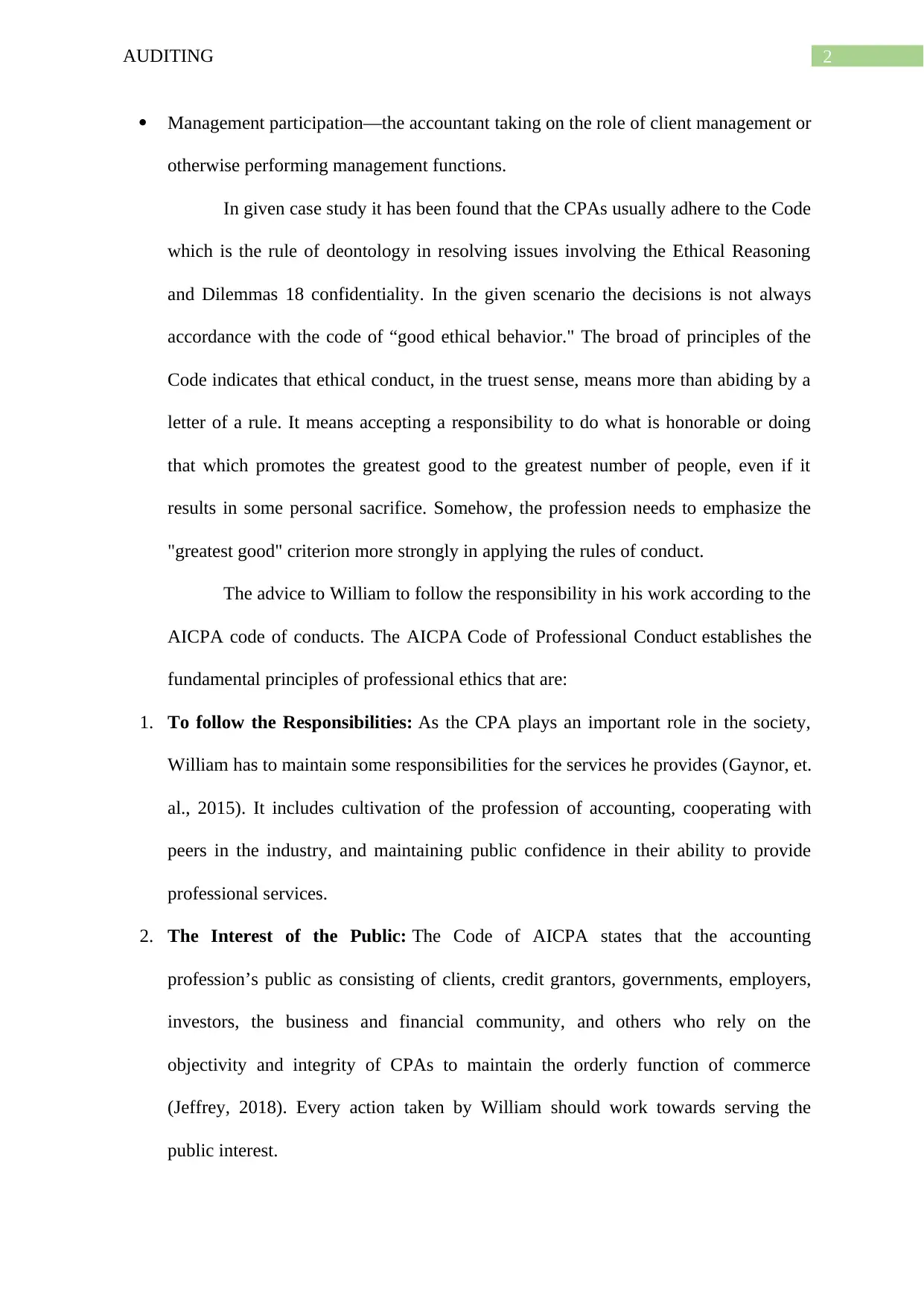
2AUDITING
Management participation—the accountant taking on the role of client management or
otherwise performing management functions.
In given case study it has been found that the CPAs usually adhere to the Code
which is the rule of deontology in resolving issues involving the Ethical Reasoning
and Dilemmas 18 confidentiality. In the given scenario the decisions is not always
accordance with the code of “good ethical behavior." The broad of principles of the
Code indicates that ethical conduct, in the truest sense, means more than abiding by a
letter of a rule. It means accepting a responsibility to do what is honorable or doing
that which promotes the greatest good to the greatest number of people, even if it
results in some personal sacrifice. Somehow, the profession needs to emphasize the
"greatest good" criterion more strongly in applying the rules of conduct.
The advice to William to follow the responsibility in his work according to the
AICPA code of conducts. The AICPA Code of Professional Conduct establishes the
fundamental principles of professional ethics that are:
1. To follow the Responsibilities: As the CPA plays an important role in the society,
William has to maintain some responsibilities for the services he provides (Gaynor, et.
al., 2015). It includes cultivation of the profession of accounting, cooperating with
peers in the industry, and maintaining public confidence in their ability to provide
professional services.
2. The Interest of the Public: The Code of AICPA states that the accounting
profession’s public as consisting of clients, credit grantors, governments, employers,
investors, the business and financial community, and others who rely on the
objectivity and integrity of CPAs to maintain the orderly function of commerce
(Jeffrey, 2018). Every action taken by William should work towards serving the
public interest.
Management participation—the accountant taking on the role of client management or
otherwise performing management functions.
In given case study it has been found that the CPAs usually adhere to the Code
which is the rule of deontology in resolving issues involving the Ethical Reasoning
and Dilemmas 18 confidentiality. In the given scenario the decisions is not always
accordance with the code of “good ethical behavior." The broad of principles of the
Code indicates that ethical conduct, in the truest sense, means more than abiding by a
letter of a rule. It means accepting a responsibility to do what is honorable or doing
that which promotes the greatest good to the greatest number of people, even if it
results in some personal sacrifice. Somehow, the profession needs to emphasize the
"greatest good" criterion more strongly in applying the rules of conduct.
The advice to William to follow the responsibility in his work according to the
AICPA code of conducts. The AICPA Code of Professional Conduct establishes the
fundamental principles of professional ethics that are:
1. To follow the Responsibilities: As the CPA plays an important role in the society,
William has to maintain some responsibilities for the services he provides (Gaynor, et.
al., 2015). It includes cultivation of the profession of accounting, cooperating with
peers in the industry, and maintaining public confidence in their ability to provide
professional services.
2. The Interest of the Public: The Code of AICPA states that the accounting
profession’s public as consisting of clients, credit grantors, governments, employers,
investors, the business and financial community, and others who rely on the
objectivity and integrity of CPAs to maintain the orderly function of commerce
(Jeffrey, 2018). Every action taken by William should work towards serving the
public interest.
⊘ This is a preview!⊘
Do you want full access?
Subscribe today to unlock all pages.

Trusted by 1+ million students worldwide
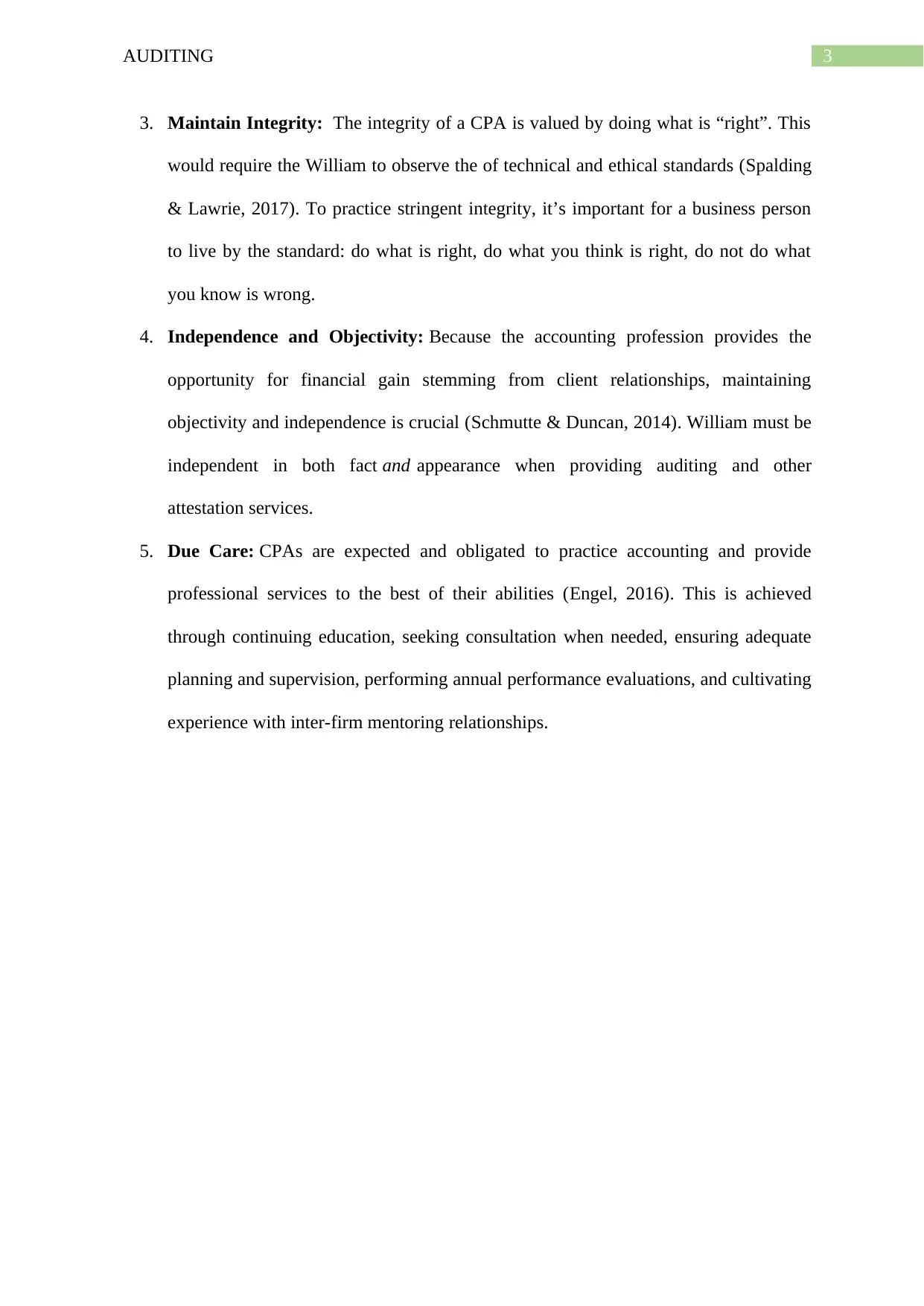
3AUDITING
3. Maintain Integrity: The integrity of a CPA is valued by doing what is “right”. This
would require the William to observe the of technical and ethical standards (Spalding
& Lawrie, 2017). To practice stringent integrity, it’s important for a business person
to live by the standard: do what is right, do what you think is right, do not do what
you know is wrong.
4. Independence and Objectivity: Because the accounting profession provides the
opportunity for financial gain stemming from client relationships, maintaining
objectivity and independence is crucial (Schmutte & Duncan, 2014). William must be
independent in both fact and appearance when providing auditing and other
attestation services.
5. Due Care: CPAs are expected and obligated to practice accounting and provide
professional services to the best of their abilities (Engel, 2016). This is achieved
through continuing education, seeking consultation when needed, ensuring adequate
planning and supervision, performing annual performance evaluations, and cultivating
experience with inter-firm mentoring relationships.
3. Maintain Integrity: The integrity of a CPA is valued by doing what is “right”. This
would require the William to observe the of technical and ethical standards (Spalding
& Lawrie, 2017). To practice stringent integrity, it’s important for a business person
to live by the standard: do what is right, do what you think is right, do not do what
you know is wrong.
4. Independence and Objectivity: Because the accounting profession provides the
opportunity for financial gain stemming from client relationships, maintaining
objectivity and independence is crucial (Schmutte & Duncan, 2014). William must be
independent in both fact and appearance when providing auditing and other
attestation services.
5. Due Care: CPAs are expected and obligated to practice accounting and provide
professional services to the best of their abilities (Engel, 2016). This is achieved
through continuing education, seeking consultation when needed, ensuring adequate
planning and supervision, performing annual performance evaluations, and cultivating
experience with inter-firm mentoring relationships.
Paraphrase This Document
Need a fresh take? Get an instant paraphrase of this document with our AI Paraphraser
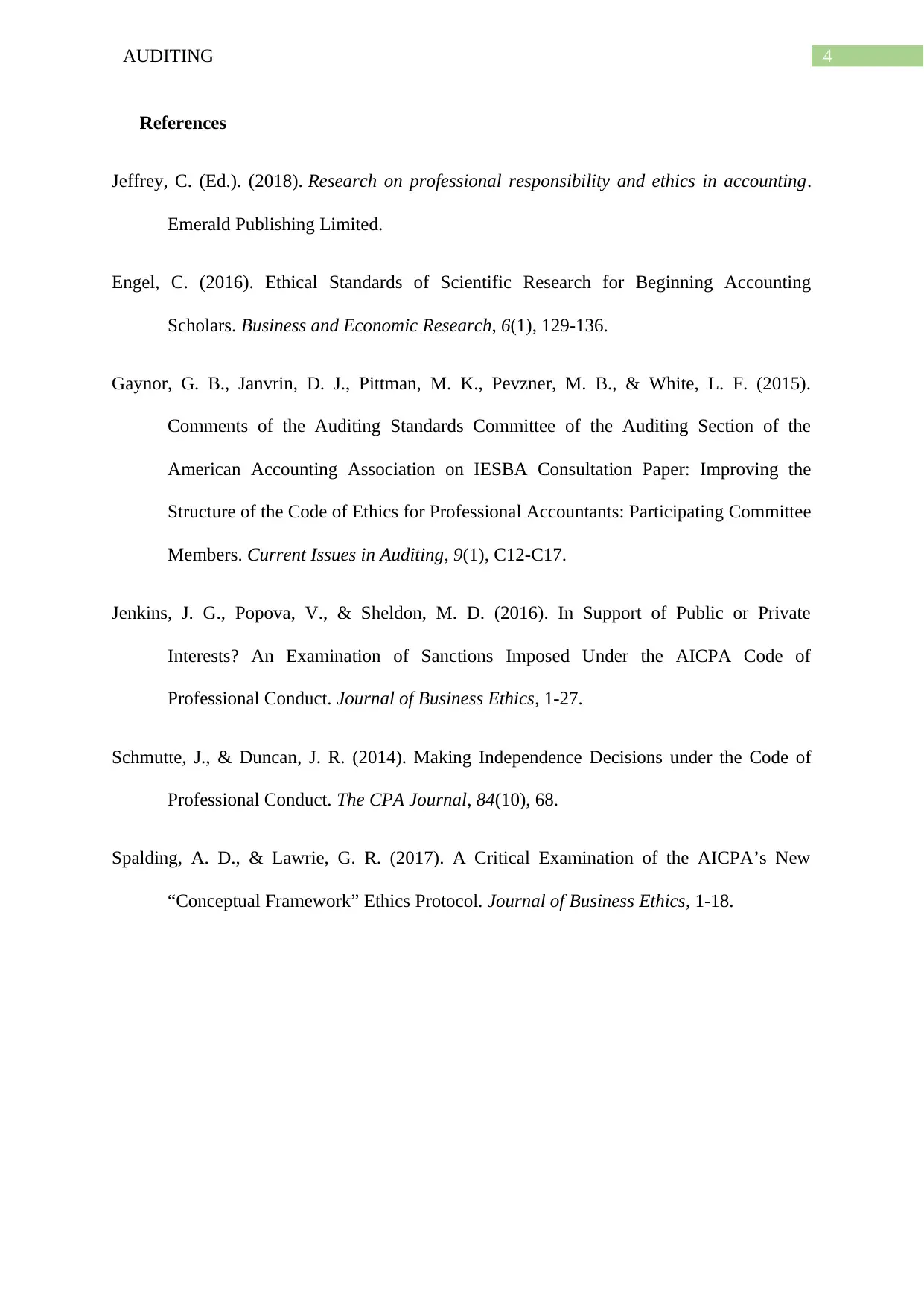
4AUDITING
References
Jeffrey, C. (Ed.). (2018). Research on professional responsibility and ethics in accounting.
Emerald Publishing Limited.
Engel, C. (2016). Ethical Standards of Scientific Research for Beginning Accounting
Scholars. Business and Economic Research, 6(1), 129-136.
Gaynor, G. B., Janvrin, D. J., Pittman, M. K., Pevzner, M. B., & White, L. F. (2015).
Comments of the Auditing Standards Committee of the Auditing Section of the
American Accounting Association on IESBA Consultation Paper: Improving the
Structure of the Code of Ethics for Professional Accountants: Participating Committee
Members. Current Issues in Auditing, 9(1), C12-C17.
Jenkins, J. G., Popova, V., & Sheldon, M. D. (2016). In Support of Public or Private
Interests? An Examination of Sanctions Imposed Under the AICPA Code of
Professional Conduct. Journal of Business Ethics, 1-27.
Schmutte, J., & Duncan, J. R. (2014). Making Independence Decisions under the Code of
Professional Conduct. The CPA Journal, 84(10), 68.
Spalding, A. D., & Lawrie, G. R. (2017). A Critical Examination of the AICPA’s New
“Conceptual Framework” Ethics Protocol. Journal of Business Ethics, 1-18.
References
Jeffrey, C. (Ed.). (2018). Research on professional responsibility and ethics in accounting.
Emerald Publishing Limited.
Engel, C. (2016). Ethical Standards of Scientific Research for Beginning Accounting
Scholars. Business and Economic Research, 6(1), 129-136.
Gaynor, G. B., Janvrin, D. J., Pittman, M. K., Pevzner, M. B., & White, L. F. (2015).
Comments of the Auditing Standards Committee of the Auditing Section of the
American Accounting Association on IESBA Consultation Paper: Improving the
Structure of the Code of Ethics for Professional Accountants: Participating Committee
Members. Current Issues in Auditing, 9(1), C12-C17.
Jenkins, J. G., Popova, V., & Sheldon, M. D. (2016). In Support of Public or Private
Interests? An Examination of Sanctions Imposed Under the AICPA Code of
Professional Conduct. Journal of Business Ethics, 1-27.
Schmutte, J., & Duncan, J. R. (2014). Making Independence Decisions under the Code of
Professional Conduct. The CPA Journal, 84(10), 68.
Spalding, A. D., & Lawrie, G. R. (2017). A Critical Examination of the AICPA’s New
“Conceptual Framework” Ethics Protocol. Journal of Business Ethics, 1-18.

5AUDITING
⊘ This is a preview!⊘
Do you want full access?
Subscribe today to unlock all pages.

Trusted by 1+ million students worldwide
1 out of 6
Related Documents
Your All-in-One AI-Powered Toolkit for Academic Success.
+13062052269
info@desklib.com
Available 24*7 on WhatsApp / Email
![[object Object]](/_next/static/media/star-bottom.7253800d.svg)
Unlock your academic potential
Copyright © 2020–2026 A2Z Services. All Rights Reserved. Developed and managed by ZUCOL.





